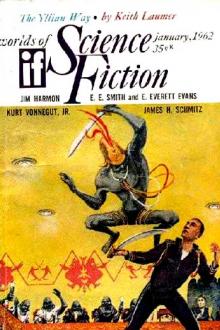Bat Wing by Sax Rohmer (bts books to read .TXT) 📗

- Author: Sax Rohmer
Book online «Bat Wing by Sax Rohmer (bts books to read .TXT) 📗». Author Sax Rohmer
“But what was the cause of her grief?”
“I simply cannot understand.”
“Is it possible that Colonel Menendez is dangerously ill?”
“It may be so, Mr. Knox, but in that event why have they not sent for a physician?”
“True,” I murmured; “and no one has been sent for?”
“No one.”
“Have you seen Colonel Menendez?”
“Not since lunch-time.”
“Have you ever known him to suffer in this way before?”
“Never. It is utterly unaccountable. Certainly during the last few months he has given up riding practically altogether, and in other ways has changed his former habits, but I have never known him to exhibit traces of any real illness.”
“Has any medical man attended him?”
“Not that I know of. Oh, there is something uncanny about it all. Whatever should I do if you were not here?”
She had spoken on impulse, and seeing her swift embarrassment:
“Miss Beverley,” I said, “I am delighted to know that my company cheers you.”
Truth to tell my heart was beating rapidly, and, so selfish is the nature of man, I was more glad to learn that my company was acceptable to Val Beverley than I should have been to have had the riddle of Cray’s Folly laid bare before me.
Those sweetly indiscreet words, however, had raised a momentary barrier between us, and we walked on silently to the house, and entered the brightly lighted hall.
The silver peal of a Chinese tubular gong rang out just when we reached the veranda, and as Val Beverley and I walked in from the garden, Madame de Stämer came wheeling through the doorway, closely followed by Paul Harley. In her the art of the toilette amounted almost to genius, and she had so successfully concealed all traces of her recent grief that I wondered if this could have been real.
“My dear Mr. Knox,” she cried, “I seem to be fated always to apologize for other people. The Colonel is truly desolate, but he cannot join us for dinner. I have already explained to Mr. Harley.”
Harley inclined his head sympathetically, and assisted to arrange Madame in her place.
“The Colonel requests us to smoke a cigar with him after dinner, Knox,” he said, glancing across to me. “It would seem that troubles never come singly.”
“Ah,” Madame shrugged her shoulders, which her low gown left daringly bare, “they come in flocks, or not at all. But I suppose we should feel lonely in the world without a few little sorrows, eh, Mr. Harley?”
I loved her unquenchable spirit, and I have wondered often enough what I should have thought of her if I had known the truth. France has bred some wonderful women, both good and bad, but none I think more wonderful than Marie de Stämer.
If such a thing were possible, we dined more extravagantly than on the previous night. Madame’s wit was at its keenest; she was truly brilliant. Pedro, from the big bouffet at the end of the room, supervised this feast of Lucullus, and except for odd moments of silence in which Madame seemed to be listening for some distant sound, there was nothing, I think, which could have told a casual observer that a black cloud rested upon the house.
Once, interrupting a tête-à-tête between Val Beverley and Paul Harley:
“Do not encourage her, Mr. Harley,” said Madame, “she is a desperate flirt.”
“Oh, Madame,” cried Val Beverley and blushed deeply.
“You know you are, my dear, and you are very wise. Flirt all your life, but never fall in love. It is fatal, don’t you think so, Mr. Knox?”—turning to me in her rapid manner.
I looked into her still eyes, which concealed so much.
“Say, rather, that it is Fate,” I murmured.
“Yes, that is more pretty, but not so true. If I could live my life again, M. Knox,” she said, for she sometimes used the French and sometimes the English mode of address, “I should build a stone wall around my heart. It could peep over, but no one could ever reach it.”
Oddly enough, then, as it seems to me now, the spirit of unrest seemed almost to depart for awhile, and in the company of the vivacious Frenchwoman time passed very quickly up to the moment when Harley and I walked slowly upstairs to join the Colonel.
During the latter part of dinner an idea had presented itself to me which I was anxious to mention to Harley, and:
“Harley,” I said, “an explanation of the Colonel’s absence has occurred to me.”
“Really!” he replied; “possibly the same one that has occurred to me.”
“What is that?”
Paul Harley paused on the stairs, turning to me.
“You are thinking that he has taken cover from the danger which he believes particularly to threaten him to-night?”
“Exactly.”
“You may be right,” he murmured, proceeding upstairs.
He led the way to a little smoke-room which hitherto I had never visited, and in response to his knock:
“Come in,” cried the high voice of Colonel Menendez.
We entered to find ourselves in a small and very cosy room. There was a handsome oak bureau against one wall, which was littered with papers of various kinds, and there was also a large bookcase occupied almost exclusively by French novels. It occurred to me that the Colonel spent a greater part of his time in this little snuggery than in the more formal study below. At the moment of our arrival he was stretched upon a settee near which stood a little table; and on this table I observed the remains of what appeared to me to have been a fairly substantial repast. For some reason which I did not pause to analyze at the moment I noted with disfavour the presence of a bowl of roses upon the silver tray.
Colonel Menendez was smoking a cigarette, and Manoel was in the act of removing the tray.
“Gentlemen,” said the Colonel, “I have no words in which to express my sorrow. Manoel, pull up those armchairs. Help yourself to port, Mr. Harley, and fill Mr. Knox’s glass. I can recommend the cigars in the long box.”
As we seated ourselves:
“I am extremely sorry to find you indisposed, sir,” said Harley.
He was watching the dark face keenly, and probably thinking,





Comments (0)